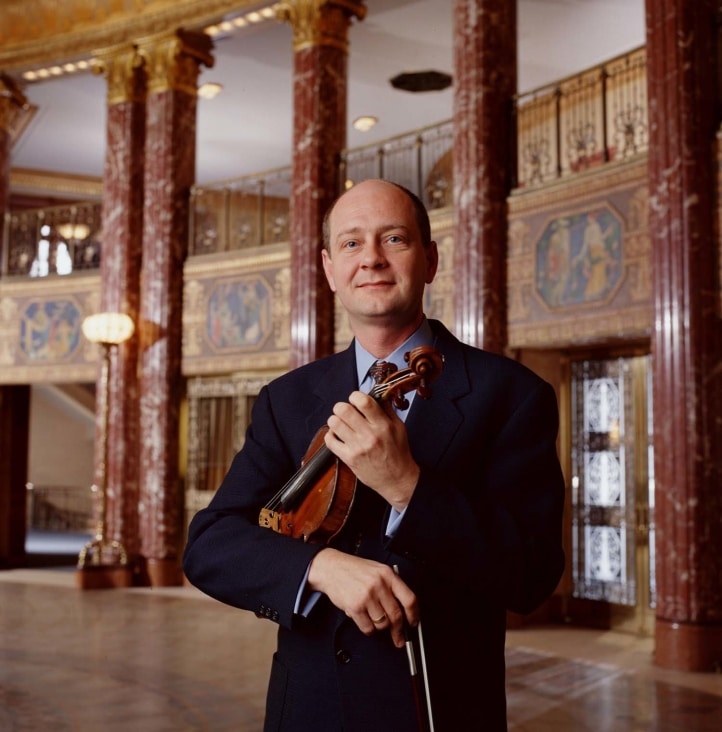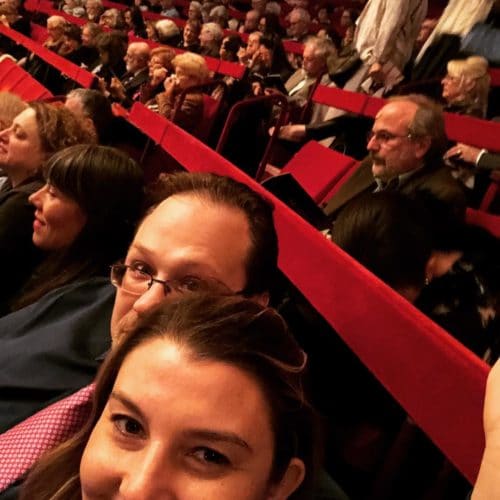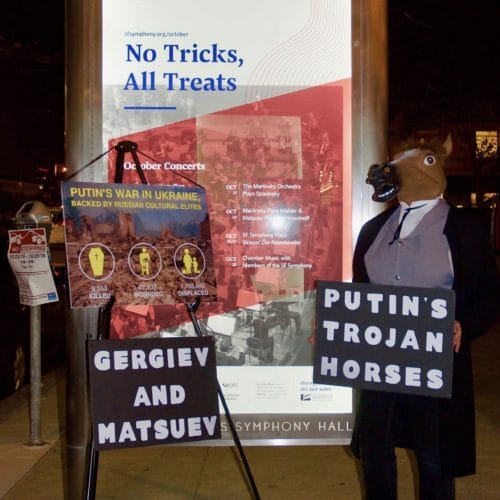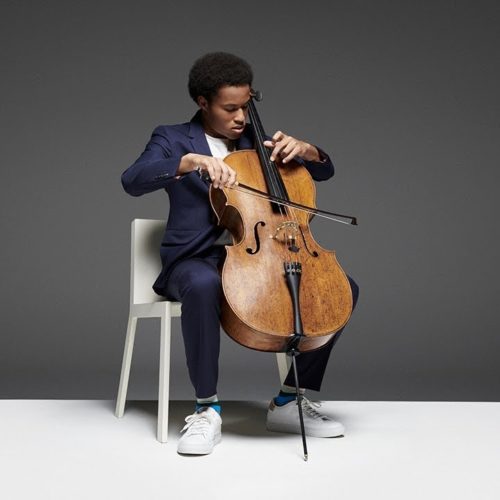In the state of Vermont Lucy Rogers and Zac Mayo are running against each other for election to State House.
But they have taken to ending political hustings with a song, one playing guitar, the other cello.
This is not Donald Trump’s America.
In the state of Vermont Lucy Rogers and Zac Mayo are running against each other for election to State House.
But they have taken to ending political hustings with a song, one playing guitar, the other cello.
This is not Donald Trump’s America.
The Cleveland Orchestra today published its investigation into allegations of sexual harassment and took drastic action against its highest-ranked musician. It also confirmed the dismissal of principal trombone Massimo La Rosa.
The orchestra said in a statement: After a thorough, independent investigation led by a special committee of its board, The Cleveland Orchestra today announced findings leading to the termination of concertmaster William Preucil and principal trombonist Massimo La Rosa. Mr. Preucil and Mr. La Rosa had been suspended from the Orchestra following allegations of sexual misconduct raised earlier this year by female musicians…
The investigators found that Mr. Preucil and Mr. La Rosa engaged in sexual misconduct and sexually harassing behavior with multiple female students and colleagues over a period of years while employed by the Orchestra. Moreover, the abusive conduct by both performers was made possible by their positions of power within the Orchestra and in the broader world of classical music. According to the investigation, women who were victims were intimidated by Mr. Preucil and Mr. La Rosa, and were afraid to take action after they were subjected to the unwelcome behavior. Details related to any specific individual will remain confidential and the identity of those who came forward will remain known only to the investigators.
You can read the full investigation report here.

Preucil’s sacking creates huge issues for the orchestra. Reputedly the highest paid concertmaster in the US, he is a violinist of the highest calibre and a massive figure of authority in the orchestra. He will not easily be replaced.
At least two members of his family play in the orchestra. Their position will be delicate.
Our newly enthused opera goers Elizabeth Frayer and Shawn Milnes are back with a fresh view of Nico Muhly’s opera and Jonas Kaufmann’s return to the Met.
The couple make no pretence to being opera critics. They just tell it how it is.
For instance:
Elizabeth: I was very excited to see the new Nico Mulhy opera, Marnie. I did not watch the movie or read the book beforehand, solely relying on the synopsis. All the singers Friday evening were terrific, especially Isabel Leonard. And the sets were terrific, moving and creating entire rooms in some cases using very little. The imagery—the ship, the clouds moving, horses galloping added to the creative uses of stage and lighting.
But. I felt I was being told a story in vignettes, instead of watching a story being acted/sung. The opera ended up feeling static and passive as a result. I was very aware of sitting in my seat, which was such a shame as there was so much that was great about this opera…
Read on here.
Shawn: And now, Marnie. Marnie, Marnie, Marnie. Marnie that I have looked forward to with great anticipation since the announcement of its commission in 2015. This needs a little background. I really enjoyed Two Boys. Seemingly I was one of the few, but I greatly enjoyed it and said so at the time (as did Salman Rushdie incidentally). And my affection for it has grown mightily over time.
BUT I, like a fool, only saw it once during its run at the Met in 2013. But I feel love for it. The internet chorus sequences fromTwo Boys still haunt me. I can conjure them and hear them and see them in my mind as vividly as anything I’ve seen on stage at the Met EVER (and that’s saying a lot) but with only one viewing I can’t REALLY be sure, as my love for it may have become embellished by fantastic nostalgia over the years. In fact my affection for it, embellished or otherwise, is so profound, in discussions with friends and colleagues about The Future of Opera I almost always say “the answer to the future of opera wasn’t fully realized in Two Boys, but the answer to the future of opera is somewhere to be found IN Two Boys!” Ask around, I’ve said this endlessly. Especially as discussions about The Future of Opera seem to be occurring endlessly. At least in our little niche of a niche of a niche of an art form community. I’m quite sure I’ve pounded on a table or two while saying it. So I loved it. But I need to see it again to be sure. Table pounding defenses notwithstanding.
So having seen Two Boys only once, I began my policy of seeing all new works a minimum of twice, three times is better, but a MINIMUM of twice. So I went to the final dress and opening night of Marnie. I may go again but I have much to say already.
The libretto, based on the book which fair warning is far different than the movie, was all over the place. The Librettist, Nicholas Wright, gave us mini monologues from Marnie, sprinkled like guide posts throughout the entire opera, where Marnie tells us her inner feelings and then follows those up with mini scenes supposed to demonstrate those feelings Marnie has just explained to us. This is not how effective storytelling works. The entire opera felt a bit like a musical essay on the subject of Marnie – Marnie tells us she feels this way, then a mini scene is presented as evidence to demonstrate (and often not very clearly nor convincingly) what Marnie has just told us.
Read on here.

In the midst of the Saudi furore, not everyone has forgotten Russian crimes – or the musicians who cover for Putin’s misdeeds.
In San Francisco, activists from Arts Against Aggression protested against two concerts by Valery Gergiev and the pianist Denis Matsuev.
Both are committed Putin apologists.

From the Irish mezzo-soprano Gráinne Gillis. Special to Slipped Disc:
I’ve been thinking about the production of Don Giovanni in Australia, where the director looked for 200 naked women (or women that are suddenly inspired to throw their clothes off in the name of ’empowerment’).
I believe the show has got great reviews, mainly on its Don G, Duncan Rock (so great job on that) but there are a couple of things about this that really, really irk me.
First caveat: I’ve been naked on stage. It was part of a contract for a job that I had, as an actress. I’m very comfortable with just getting on with things in mixed dressing rooms etc and have few issues with my meat-suit beyond wanting to shift some extra poundage at the moment. However, my experience of being naked on stage, because it was badly handled by the company, left me feeling uncomfortable and exploited and vulnerable. I can honestly say that it was in no way ’empowering’. It didn’t leave me with hang-ups about my body or anything else – I just understood at that time and since that being naked onstage is a vulnerable position to put yourself in, and you can’t control the reactions of other people, however many promises of respect in the workplace are made by the company etc. You can’t control the reaction of your colleagues or indeed the audience.
Second caveat: I have no issue with updating opera, as long as it works and is faithful to the core story. In fact, to object to updating opera would be pretty hypocritical on my part, given that the current production I’m in (at the King’s Head Theatre in London) sets La Traviata in a pole-dancing club. However, it retains the major plot elements of the story, and in my opinion, it works. Others may not agree with this – and that’s absolutely fine too.
So, apparently this mass shedding of clothes happens when Don G descends into hell. Now, I’ve only seen this opera a couple of times, but riddle me this: isn’t that Don G’s idea of a good time? Surely it would be more radical for Don G to be stripped by 200 women and then for them to laugh at him – isn’t that what his idea of hell would be? Or beat him up, or something?
Moreover, if we’re looking at nudity as a form of ’empowerment’ – how about directors who insist on nudity directing the show in the nip? I mean, it’s so powerful, right? I remember the first opera I did where a director was looking for a fall from a singer and explaining it to her, and she very calmly insisted that he show her first before she attempted it. Her point was that it wasn’t a particularly safe fall as it stood and that he should lead by example. I do think that directors should be prepared to demonstrate – it’s a basic requirement of the job, to be a leader. It may have been taken out of context, but the director of the show was quoted as saying she ‘might’, if the notion took her, take off her clothes in solidarity with these women. ‘MIGHT?!!’ Hmmm. I call ’empowerment’ BS.
There is a bit of distraction element as well in play when directors go down the gratuitous nudity route. I was at a production recently of an opera that had the most magical opening, playing with the element of light in the overture. I was transported, magically in those few minutes – until the director had some singers do some movements which were writ large on a screen behind, still playing with light, but with what looked very much like their labia on display. Nothing against the labia – I’m very fond of mine – but it jerked me out of that magical feeling to wondering ‘Am I really seeing this? Not sure if I’m seeing this – why not use flesh-coloured pants in that? Etc’ and down a rabbit-hole of musings which really just worked against the magical set-up. It took me away from the story and the magic of the theatre, which, given the auspicious beginning, was a shame.On the other hand, I went to a phenomenal performance of Tannhauser last year at Deustche Oper which used nudity profusely (both male and female) and which was perfectly in harmony with the plot – no points to be made, just to serve and enhance the story-telling.
Not to mention, with these 200 volunteers that may or may not fling their clothes off in a moment of ecstasy, the fact that these are volunteers indicates that it puts a lot of actors out of work for that period. Side issue, but part of the conversation, nonetheless, given cutbacks in the arts.
I’m happy, as a performer, to push boundaries. As long as it fits in with the story, and I’m able to make sense of my character, I don’t mind too much. And of course, you just get on with whatever job and contract you’re doing, that goes without saying. But saying that you’re asking 200 women to volunteer to get naked, in a scene from Don G set in hell, to make a point about #MeToo – please. The ‘leaks’ to the press about it felt opportunistic and ill-judged. I’ve been told by a few people that what the director said might have been sensationalized, and having read a few of the reviews, I understand the link with the 1003 women Don Juan raped and seduced. I’m still not convinced that as a character it would be ‘hell’ for him.

Don’t get me wrong – I’m all for experimentation. Experiments in theatre and opera are important and it is important people are allowed to try, to succeed and to fail. No issues there. The director is female, by all accounts a feminist – and hooray, let’s have more directors like this telling stories in theatres and opera houses worldwide. However, in an age of #MeToo, where survivors are only just relatively recently telling their stories, then having to listen to the rantings of a Brett Kavanaugh, the apologies to him from the POTUS, and are marching and protesting – funnily enough, WITH THEIR CLOTHES ON – I’m slightly skeptical about anything that doesn’t empower women, and renders them as faceless, nameless meat-sacks en masse on a stage. Again, I’m sure that wasn’t the intention – but part of the process of #MeToo is humanizing women, so that they’re not just merely someone’s daughter, mother, sister: but so we start see women (as a society) as individual human beings, with (in the case of #MeToo survivors) individual stories of trauma endured by the prevalence of a system of patriarchy, the key purpose of which is to diminish women’s humanity and render us as mere objects, to be taken by any man with notions of droit de seigneur. That’s the key political point of #MeToo which I feel is often missed.
At this stage, being slightly world-weary and jaded, and having experienced/heard every concept directors have come up with (including one in Finland, where apparently the actors threw faeces that had been collected at the audience – ‘It’s a shit production – literally!’), here’s a fricking radical idea:
TELL THE STORY.
No less, and no more.
SEE ALSO: Stripping and shaming on the opera stage
Paul Smith dressed Sheku Kanneh-Mason for the royal wedding.
Now Sheku is starring as his model, promoted across all media.
